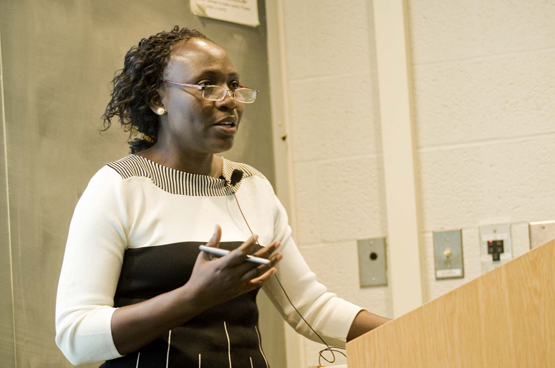Volunteer for Haiti, but Do It from Home
Well-meaning novices hamper island relief efforts

In the aftermath of the worst natural disaster in Haiti’s recorded history, dozens of BU’s medical and public health students, doctors, and nurses have been scrambling for ways to join the relief effort. But for at least for the next few months, said Monica Onyango, a School of Public Health international public health lecturer, most would be far more useful if they worked from home.
Addressing an overflow crowd of students and faculty yesterday at SPH, Onyango, one of three speakers at The Aftermath of Haiti’s Earthquake: Public Health’s Role, an emergency forum moderated by SPH Dean Robert Meenan (MED’72, GSM’89), outlined the realities of field work in a chaotic, ill-equipped landscape of human misery.
 “The first thing you ask is, how can I help?” Onyango said. “You need to ask yourself, critically, can I handle the emotional overload? If you see a hundred dead bodies, is this something you can deal with?” If not, she warned, “You will be a burden.” Onyango reminded the group that there is no hurry to help: there will be on-site opportunities in Haiti for months and years to come. “All those cameras are going to go away, and the people will be left to their own devices,” she said.
“The first thing you ask is, how can I help?” Onyango said. “You need to ask yourself, critically, can I handle the emotional overload? If you see a hundred dead bodies, is this something you can deal with?” If not, she warned, “You will be a burden.” Onyango reminded the group that there is no hurry to help: there will be on-site opportunities in Haiti for months and years to come. “All those cameras are going to go away, and the people will be left to their own devices,” she said.
Onyango’s comments were echoed by medical logistics consultant Libby Levison (SPH’03), who spent five months in Haiti last year under contract with Doctors Without Borders. She related some of the challenges of living and working in Port au Prince before the quake — undrinkable and intermittent water, endless traffic gridlock, electricity for at best a few hours a day. Levison was based at an obstetrics hospital set up by doctors from Holland to handle difficult cases. The staff ended up delivering between 800 and 1,200 babies a month, in a 60-bed hospital. The Port-au-Prince home Levison lived in collapsed in the quake. But Levison, who knows the Haitian capital intimately and loves Haiti’s people, will not be traveling there in the immediate future. “I’m not strong enough,” she said. “I’m not even offering. If I go now, I’ll be no help to anybody.”
Both Onyango and Levison emphatically warned that freelance volunteers, especially those with no disaster training, would only get in the way of organized efforts. Levison also urged well-meaning people not to send prescription medicines to Haiti, where they will only have to be destroyed, at a price. It is also far too soon to send clothing or goods of any kind, she said. Instead, she told the crowd that in addition to donating much-needed cash to the relief effort, there is much to be done at home. For example, she spends hours on Facebook sharing information and offering comfort to Haitian friends as well as to distraught friends in the aid community.
Mary Clark, emergency preparedness director for the Massachusetts public health department, spoke to the group about providing support and services to local Haitians. You can help get people connected, said Clark, who told the audience that the state’s 211 line explains, in French and Creole, how and where to get information. There are opportunities right now for translators, as well as mental health volunteers, 200 of whom have already had disaster training. If, as anticipated, Haitians will soon begin to seek refuge among their relatives in the United States, legal advisors and advocates will be needed to help with housing and other needs. In the months to come, the services of law students will be a big help to Haitians wanting to extend their U.S. residency under the federal government’s expanded protected status. And returning aid workers and medical volunteers will need emotional support as well.
As for offering assistance to the many grieving Haitians here at home, the clearest advice came from psychiatrist Michael Grodin, an SPH professor of health law, bioethics, and human rights and cofounder of the BU-based Boston Center for Refugee Health and Human Rights, who shared his experience treating traumatized refugees. “Don’t talk,” he said. “Just listen, listen, listen.”
Volunteer at Relief Center, an emergency resource center set up to assist the families of earthquake victims and survivors, which opens today at the Mattapan branch library on Blue Hill Avenue. Coordinated by staff from the Service Employees International Union and the Boston Public Health Commission, it provides on-site mental health counselors and other services. To help, contact haitiansupport@bphc.org. Or look for opportunities on the new BUSPH Help Haiti site.
Many individual communities are establishing their own fund drives and activities, according to Mary Clark; find volunteer opportunities here.
Susan Seligson can be reached at sueselig@bu.edu.
Comments & Discussion
Boston University moderates comments to facilitate an informed, substantive, civil conversation. Abusive, profane, self-promotional, misleading, incoherent or off-topic comments will be rejected. Moderators are staffed during regular business hours (EST) and can only accept comments written in English. Statistics or facts must include a citation or a link to the citation.